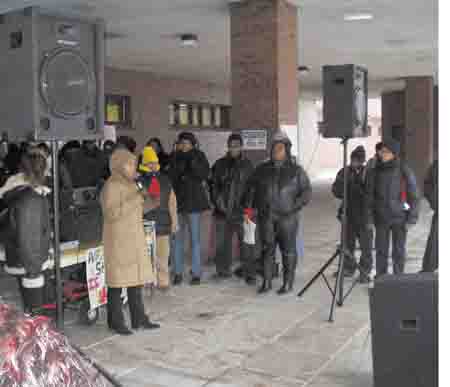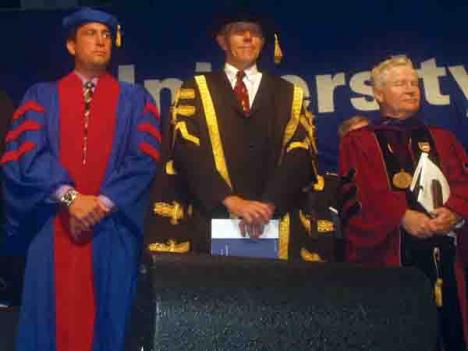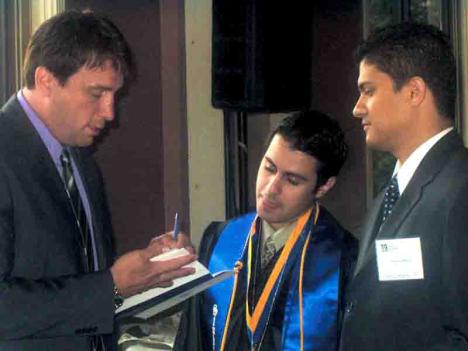Africana Studies Burdened by Govt. Reduced Spending on Higher Ed.

January 15, 2003
UMass Boston Africana Studies department is unable to get a tenured professor position line. Athough some people believe this is putting the program in danger of collapse, it may be the unavoidable reality due to, according to a memo from Chancellor Jo Ann Gora, a ten million dollar budget cut for the school over two years.
The failure to be awarded one of the few tenured position lines has led to a growing concern on campus that three very popular introductory courses in Africana studies would no longer be offered. However, what happens in these situations is that a non-tenured, temporary line, professor is hired to teach any courses necessary in the wake of the professor who resigned.
Associate Provost Winston Langley said, “the fact that it’s a temporary line does not mean that the department will not be able to re-authorize the teaching of [these courses], it just will have to be staffed by someone whose not a tenured professor.” Provost and Vice Chancellor for Academic Affairs Paul Fonteyn said that “we have some (temporary line) faculty that’s been here fifteen years, part-time just means that you’re not tenured faculty.”
With the resignation of one tenured Africana Studies professor, funding for a replacement did not come automatically. After the professor resigned the department then had to apply for funding from the school in order to hire a replacement. Interim Dean of Liberal Arts Louise Smith said, “the position request for a scholar in African American History was one of twenty-five positions requested by departments in the Liberal Arts for searches to be conducted during 02-03.” However, despite a large need for tenure track professors in the Liberal Arts at UMass Boston, Smith said, only “ten searches were authorized and are now in progress.”
Due to the budget cut to the tune of ten million dollars, there’s also a significant amount of competition because so many departments lost professors to early retirement. Fonteyn said, “we lost around seventy professors to retirement last year. The Chancellor wants to replace all of the professors, [so] we’re trying to replace eighty percent of those lost to retirement over a three year period.”
Fonteyn said that this year there were sixty-nine requests for new tenure track professors at UMass Boston and only twenty-three were authorized to initiate their search. Considering many different criteria is necessary to determine which program is authorized a new tenure track professor; Fonteyn said the administration must “make decisions based on student need, number of majors, curricular aspects. If you have a curriculum that goes from a to b to c and if you don’t have anyone in that area, then you’ll have to fill that [need].” Each department has specific needs based on the nature of the program; for example “the nursing area is mandated by state to have student to teacher ratio of 8:1,” Fonteyn said. However, there’s more to the process than just curricular criteria, state mandates and student need. “Universities don’t like to be tenured up, [if they are] then that gives them no flexibility,” Fonteyn said.
Africana Studies department, like every department at UMass Boston, is eligible to seek authorization for a tenure track position each year, even if they’ve been denied the year before. Smith said, “requests for this position and the other fourteen positions not authorized for ’02-’03 searches may be renewed next year.” Robert Johnson, Associate Professor and Chair of Africana Studies, said the Africana Studies department plans to reapply for the permanent line in January, 2003.
However, interpretations have varied on campus about what the long-term outcome will be for the Africana-Studies department since it did not receive authorization to search for a tenure track professor. Johnson said the loss of “a tenure track scholar to teach and research in the field of African-American History… will cripple (the) department and devastate our major. The University should give it the highest priority if it is truly committed to diversity and the urban mission.”
The College of Liberal Arts feels the needs of the Africana Studies department are high on its list of priorities. Interim Dean Smith said “although the African American History search was among those I recommended to the Provost, it was not authorized for a ’02-’03 search, nor were three other searches I recommended. The Chancellor and Provost reasoned, and I concur, that enrollment pressures in the Africana Studies Department as a whole are less urgent than in departments where searches were authorized.”
Although the Africana Studies may not have highest priority this year for the university, it’s not easy to draw the conclusion that the administration is not committed to the urban mission based on the Africana Studies situation alone. The Chancellor’s on the Executive Committee of the National Association of State Universities and Land-Grant Colleges’ Commission on the Urban Agenda, and under the Provost’s watch, San Francisco State University (SFSU) became the top grantee in the nation for grants from the National Institutes of Health to support minority training in the sciences, and now SFSU is emerging as a leader in the preparation of minority students for entry into Ph.D.
Students here at UMass Boston, however, are frustrated by the situation. Riche Zamor, a junior at UMB with a minor in Africana Studies, said “I don’t believe it should’ve been made a part-time position in the first place… if that’s part of the procedure than that’s understandable, but until that’s clarified there’s going to be an air of mystery about why is it every year Africana-Studies is going to have to re-apply just to keep a professor here to teach these courses.”
UMB senior Steve Allen is an Art major and has taken two of the three courses now taught by the part-time professor and said that the Africana courses “gave me a lot of knowledge.” Francoise Rufen Blanchette, Senior, “feels that these classes offer a lot of historical background and information that people need to know to be more informed about this culture.” Blanchette also said a co-worker of hers feels that the university always puts more emphasis on Business majors and there should be more resources put towards the arts.
Gulet Shirdon, who majors in Africana Studies, said, “I think it’s a tragedy. If you listen to the rhetoric of the Administration during orientations and open houses one of the main platforms they stand on is the school’s diversity; UMB is a microcosm of America because of it’s diversity. The Africana-Studies department is more than just another institution at the University, it’s a comfort zone, and to [jepordize] that is hugely short-changing the whole UMass population. One of my main reasons for transfering from another institution was the strong Africana-Studies department that existed here.
In the face of the strong feelings felt by many students and faculty here at UMass Boston about the decision to not award the Africana Studies department with the requested full-time professor line, Langley says of the motivations behind the Administration’s actions, “this is not to deny the importance of the line that Africana Studies is seeking. I think the Provost recognizes that it’s a very important line.”
When asked if the student body intends to impose its will on the Administration, Riche Zamor replies “we’re looking forward to working with the administration to get that a full-time position.”






















































